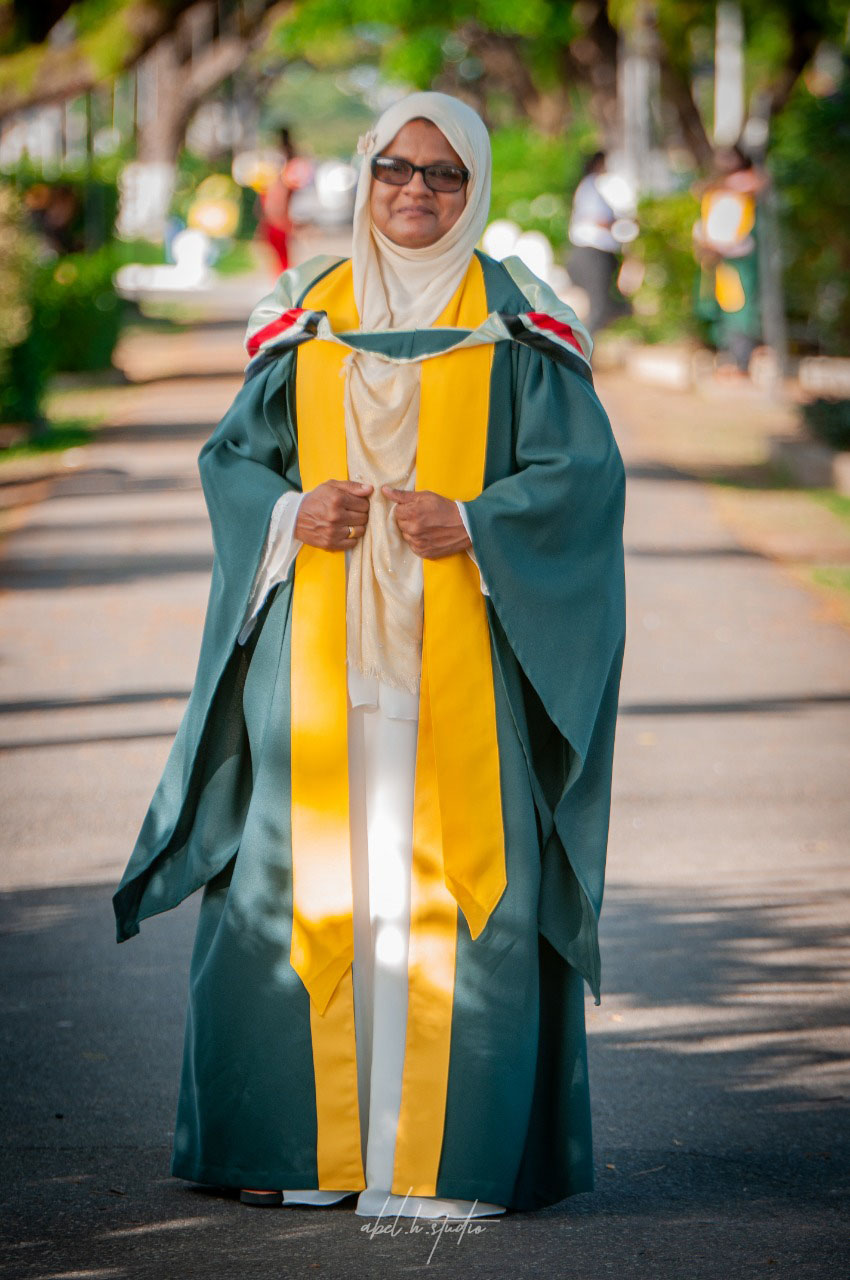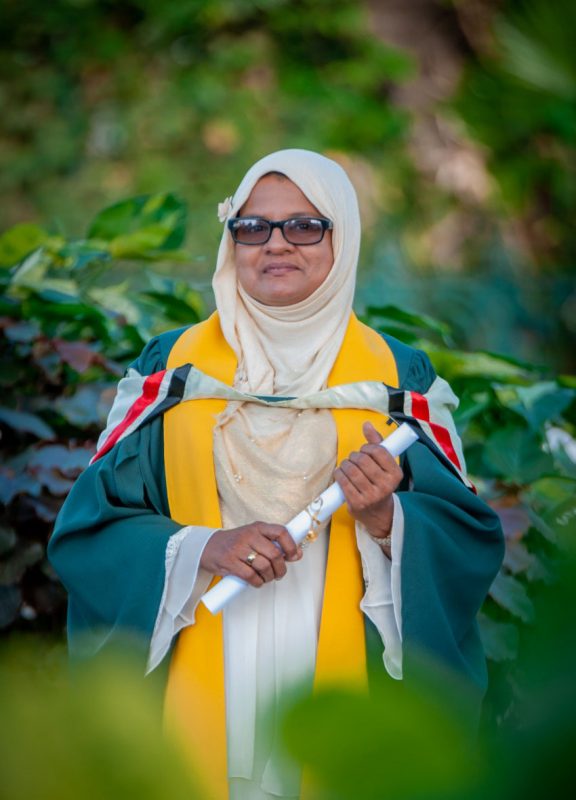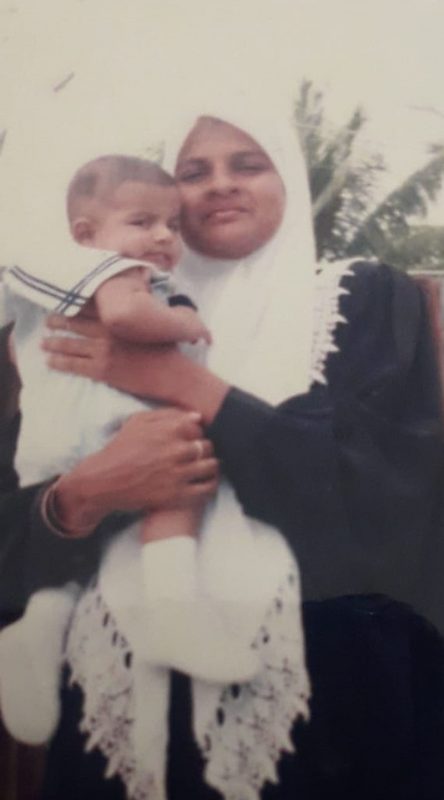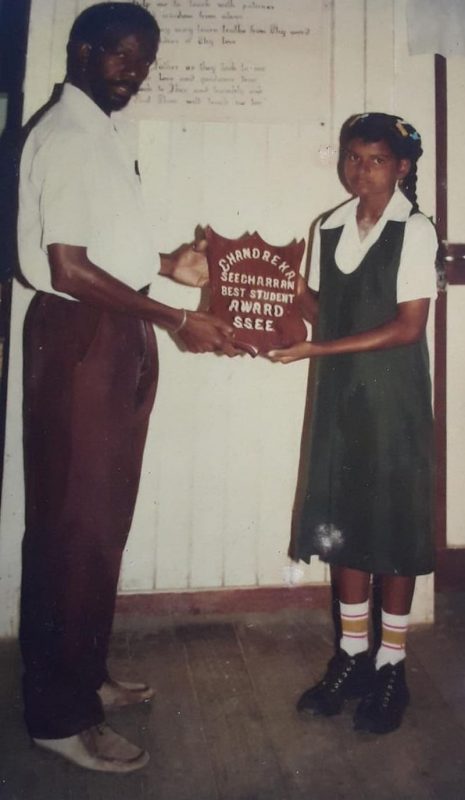When Robeena Zaman recently earned her Master’s Degree in Social Work, it was much more than an academic accomplishment. For Zaman, it represented another chapter in her story of triumph over the many stumbling blocks thrown her way throughout her life, including being rejected by her first husband just ten weeks into their marriage after she got pregnant.
It was all she had encountered and endured that eventually drew Zaman, albeit a little late in her life, to becoming a social worker and working primarily with children. As a child she knew the importance of a stable home environment and she has worked tirelessly to ensure this for children since she has been attached to the Child Care and Protection Agency.
In fact, a few years ago when she was brutally attacked and slashed in the face by a young bandit it was because she had held on tightly to the bag that contained money to repair the roof of a dilapidated house so that the children who lived there could return home. Even as she sat down with Stabroek Weekend for an interview recently, she kept watching the clock as she had her mind set on rushing home to make some soup to take back to the hospital for a young teenager who had just given birth via C-section.
Zaman is a mother of three. Her two older children attended Queen’s College and the youngest is now a student of St Roses High School. She attributes her success not only to her resilience but as a staunch Muslim, to Allah, God almighty.
“… During my journey of academic success, I developed a resiliency and established a high level of integrity. I acknowledged to live is to change, to change is to mature, to mature is to go on creating oneself endlessly. I learned to let go of the things that hurt me. Whether it was guilt, anger, love, loss or betrayal. I experienced that change is never easy. Oftentimes we fight to hold on and we also fight to let go. I had to let go inside to heal what hurt me,” Zaman said.
Still basking in her success, she said that over the years she has grown from strength to strength not only in her studies and work life but also as a mother, wife, friend and as a person who gives back to humanity.
Foster care
She was just 12 years old, the youngest of her parents’ three children, when they separated. She was displaced, and a kind couple took her in and fostered her.
“When they took on the responsibility of caring for me it was more of a kind deed. I was out of school at the time and there was no hope of me returning to school [so] they decided, I would consider them my foster parents, to send me back to school…,” Zaman said.
The kind couple were Haseef Yusuf, former leader of the Guyana Islamic Trust, and his wife, Shereen Yusuf.
When she wrote the Common Entrance exam, Zaman gained a place at Anna Regina Multilateral School, the highest school in the Essequibo, which she attended for a while but because her foster parents were living at Leonora and she was admitted to Leonora Secondary. At the end of her second year, her parents reconciled and asked that she return home, and as a result she was transferred to Abram Zuil Secondary. But as fate would have it, her parents separated again, and she was displaced and returned to her foster parents, who by this time were on the East Bank Demerara. She was then enrolled at Brickdam Secondary School.
“Four secondary schools in five years,” she said, with a shake of the head.
While her foster family was always kind to her, Zaman said she still found it a challenge as she felt she could not share secrets and her “personal pain and sorrow because how much you are going to lay on people?”
But despite it all Zaman said she was self-determined, and she motivated herself, persevered and was successful in six subjects, gaining Grades 1 and 2 and distinction. She later moved to live with her mother, and she worked but decided to get married.
“I choose marriage at an early age like an escape from all of the things that was going on… I was 19 at the time. The marriage lasted for ten weeks and I was five weeks pregnant when I was put out, in my understanding, … for being pregnant or for getting pregnant,” Zaman said.
Her husband, who was seven years her senior, returned her to her mother claiming that he was going to secure a place for them to rent since his sister, with whom they lived, had an issue with her. But two weeks later he returned and said he did not want her and when she asked him about the child, he told her it was hers to take care of.
At age 20 she became a single parent and had returned to her foster parents because her mother, who had objected to her getting married, did not want her in her home. Her foster family was very supportive, but Zaman said she worked throughout as she did not want to be a burden.
Zaman’s son became her companion and comforter. She broke down in tears as she recalled that her friends and relatives had encouraged her to abort him as she was young.
Following her child’s birth, she started working with a lawyer and it was during those years that her foster father helped her to find a husband with whom she has two other children. Zaman said she continued to work as she never wanted her son to be a burden in the relationship.
She started studying law at the University of Guyana, but later dropped out because she felt she would not have been able to afford the fees to become a lawyer. She later became a teacher at a private Islamic school but because she was not qualified her salary remained paltry. While she felt insulted as she had a teaching certificate from School of the Nations, Zaman said it did not keep her down. She earned a certificate in Social Work, but that was not also recognised.
Determined Zaman then completed a diploma in Social Work and quit the school, taking up a position with a charitable organisation before returning to teaching. At age 40, she graduated with a degree in Social Work with distinction.
Empowered
Academic success empowered Zaman. As she put it, she moved from a nobody to somebody and in 2019 she gained employment with the then Ministry of Social Protection, after applying about seven times. She was not about to stop there and was later granted a scholarship to pursue a master’s degree. COVID-19 came and made it difficult, but a resilient Zaman persevered and in 2022 she received her degree with a 3.8 GPA.
“The achievement is one thing I could celebrate myself. I feel very elated, but I had to motivate myself. I had to be determined for my own personal reasons,” Zaman said.
She recalled growing up in Airy Hall, Essequibo before her parents separated. They had a lot of ducks which the children had to take care and every day they got to school late and were placed to stand in the schoolyard “shame as ever. It was always a survival mode.” She added that because of all she has experienced, she supported her children together with her husband and they sent them to a private primary school before they passed for the senior secondary schools.
Zaman said she could have allowed her challenges to kill her will, but she is the individual who rose above her challenges.
She reconciled with both of her parents and even nurtured her father when he became ill. In 2019 while she was reading for her master’s, she lost both of her parents in a three-week span and it took a toll on her.
The social worker said she has always been involved in humanitarian work and was on one such mission one morning in Albouystown, having raised some money to repair the roof of the house of a family whose six children were in state care, when she was attacked. She recalled that the bandit snatched at the bag, but she held on to it. He then whipped out a knife and fired a stab to her abdomen, but her clothing protected her, so he slashed her face three times (she received 26 stitches).
“I held on to the bag… he didn’t win… because I still had the money and the roof was fixed and all the children went back,” Zaman said.
The work Zaman does today is where she belongs as she sees herself in the vulnerable children who are suffering because of the poor decisions of their parents.
“My job is that we have to help children to understand their position and hope that we can later change the way they perceive the future. Because when children hurt some of them become hopeless, some of them cannot perceive the future in a good manner,” Zaman said.












